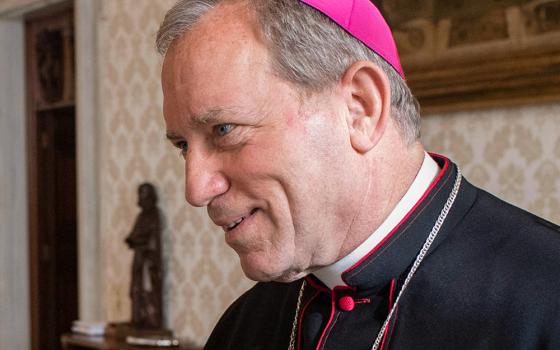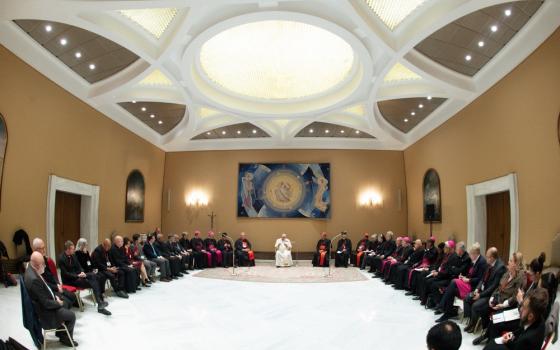Many books, pamphlets and films tell the story of nonviolent resistance. Now a new documentary has just come out, on DVD, which puts to rest the lingering question -- does nonviolence really work? It's a compelling documentary with a compelling title: "Pray the Devil Back to Hell."
The movie documents how, as recently as 2003, ordinary, unarmed women from Liberia defeated one of the most brutal dictators in modern history. And not only to him, but his henchman, his secret police, and the rebels and warlords who opposed him through guerilla warfare.
The women brought civil war to an end, disarmed the rebels, and swept the dictator from power. They laid the groundwork for a new democracy and saw to the election of Liberia's first woman president. Not a bad piece of work. And the women's only resource -- the power of nonviolence.
Liberia is a West African country of 3 million. American freed slaves founded it in 1847. But for more than a century, their descendents dominated the nation brutally. The people suffered under poverty and repression until, in 1989, civil war erupted. Matters grew worse; years of terror followed -- torture, rape, starvation and murder. By 2002, more than 20,000 had died; one in three was driven from his home.
Then like thunder in a blue sky, the women of Liberia rose up. And a leader emerged -- Leynab Gbowee, courageous and articulate. (She, not President Obama, should have won the Nobel Peace Prize.) Together the women declared themselves sick of war, sick of rape, sick of starving. They wanted peace. And, against conventional wisdom, they worked for it nonviolently.
It was a textbook case, a kind of living experiment. Consciously or not, they put to the test the Sermon on the Mount. They ventured forth on the way of the cross. They dared to topple a tyrant. They wanted peace and prosperity -- in short, wanted to save their families' lives. They risked everything for peace; they had nothing to lose.
The terror centered on Charles Taylor, at once a church-going Christian and a brutal tyrant. He came to power in 1996 -- a man, they say, who could offer you a warm smile, then order your execution. Some nights he led prayer services; the next day he ordered the massacre of his opponents. He conscripted battalions of young boys and gave them the taste of gratuitous killing. These were his death squads. Hiding behind them, he embezzled enormous sums from the national treasury.
In June 2002, Leynab Gbowee had a dream. In it, she invited the women of Liberia to come to a church and there discuss how they might make peace. She awoke and pondered the matter and set about to make the dream true. She issued the invitation and hundreds turned out. With them, she founded the Women's Peace Movement.
Originally the name was to be The Christian Women's Initiative. But one woman, Asatu Ban Kenneth, spoke up. She was Muslim and more, the local chief of police. She objected to the name. Here was a critical moment; what to do? Leynab quickly settled matters. She proclaimed the movement open to women of all religions and creeds. Women were the nation's only hope, and none would be rejected.
Instinctively, the Christian women objected in return -- they had no desire to participate with Muslims. An early impasse for the fledgling group. But Leynab was ready and she posed a question, a kind of a koan: "Does a bullet know a Christian from a Muslim?" The question pierced deep, swept aside differences. They realized, in their common losses they were one. And overwhelmingly Muslim women were embraced as sisters. The struggle was on.
They started off modestly, doing what they could. They prayed and fasted. Still, the killing went on. Rebels and warlords rampaged in the countryside; Taylor's death squads rampaged in the city. Everyone everywhere was terrorized. And in March 2003, the violence surged. Rebels went on a wide spree of rape, torture and murder. And thousands fled to Monrovia, the capital, and found asylum of sorts in makeshift refugee camps.
Taylor in turn made a decree, one without mercy. In the name of Jesus he evicted them back to the countryside -- to take their dismal chances there. "Taylor could pray the devil out of hell," one woman said in passing. He was a man of angelic piety and demonic violence, a fearsome mystery.
April, 2003, conditions in the capital began to quickly deteriorate. Forces were converging, threatening total warfare. "We had to do something forceful and fast," Leynab recalled. "So we organized a rally and asked the woman who ran the Catholic radio station, of all places, to broadcast it."
The organizers weren't sure what to do, so they opened their Bibles and read from Esther, heroine to her own people. The Liberian women were emboldened to do the same and fashioned a modest plan. Why not wear white, symbol of peace, and sit near the fish market, where Taylor often passed in his limousine?
The sit-in was attended by 2,400 women -- the first time in their history that Christian and Muslim women had publicly acted together. They sang and chanted: "We are tired of suffering, we are tired of rape, we are tired of war. We want peace." Their banner read: "The women of Liberia want peace now."
It was a gesture that put their lives at risk. They dared contest Liberia's perpetrators of violence. That is, the men. "We knew we were going to get killed," one woman says, "but by taking this action, we thought, at least we will have died for peace."
The women had spoken, and Taylor was furious. He hotly denounced and ridiculed them. Every now and then he drove by, furious and confounded. They camped out for a week.
As the week passed, the women began to befriend one another and build community, and derive from each other a sense of strength. And they grew creative -- what tactics might they employ to press their demands? One tactic they settled on goes back to ancient Greek literature -- to Aristophanes. No sexual relations with their husbands until the war ends. A woman smiled to the camera: "All our husbands began to pray with us for an end to the war."
But the war continued. Rebels raided the camp and left some dead. Hours later, government troops did the same. The women concluded that the only way to end the war was to get both sides to meet. They went to the Parliament building, sat down, and there demanded that all sides negotiate. Thousands of women came. And the contagion swept the city. More and more came, women marching in droves, waving signs and singing for peace.
Finally shamed, Taylor agreed to a meeting. The occasion marks one of the great nonviolent confrontations in recent history. On April 23, 2003, with five hundred women behind her and lordly Taylor enthroned on a chair on the stage, the heroine Leynab Gbowee presented the women's case.
The speech shone with rhetorical brilliance and it concluded powerfully: "The women of Liberia are tired of war. We are tired of running; we are tired of begging for food, we are tired of our children being raped. We want a future for our children." Taylor listened impassively, and then conceded. He would attend peace talks.
Word spread quickly, and all of Africa began talking about Liberia's heroic nonviolent women. Only one other thing needed -- to corral the opposing side.
Two days later a contingent of women headed toward Sierra Leone, where the rebels had their camp. When they arrived they found rebels and warlords coddling themselves like kings in a swanky hotel. The women in white lined the street and held up their placards. The rebels were astonished and taken aback. But the vigiling continued and the rebels succumbed. They would attend peace talks as well.
A date was set, June 4, 2003; the place, Accra, Ghana. The two factions would meet face to face. The women, however, were credulous. They knew enough that there would be no progress unless they were there. So they appealed for funds to make the trip.
Money rolled in from all the over the nation, enough to fund a delegation of hundreds. When deliberations got underway, the women were there, outside the doors, dressed in white. Quite a scene -- inside, murderers and marauders, and on the street, the implacable women demanding peace. "We are your conscience," they said. A vague warning.
The peace talks got underway then stalled. And the women got frustrated. "What is this, a vacation?" they complained. Their frustration was well founded for, meanwhile, back in Monrovia, order collapsed completely. There was little food and water to be had. And thousands fled for shelter to the city stadium.
The tearful women in Accra redoubled their efforts. "Give us peace now," they sang. Their signs multiplied, proclaiming, "No more guns, no more war." Everyone entering or leaving the building got an earful.
When back in Monrovia a rebel missile struck the U.S. Embassy, where displaced people were harbored, the women surrounded the building in Accra and linked arms. Until the carnage ended, they said, they would not leave. "The peace talks have been seized by General Leynab and her troops ..." said a mocking security guard over the PA system.
The women had locked them down. And when a warlord appeared at the door, trying to pass by, Leynab ordered: "Go back in there and sit down. If you were a real man, you wouldn't be killing your people. That's why I have to treat you like a boy. Go back and sit down and negotiate peace!"
Slowly, the tide turned. The international community got involved and on August 11, 2003, Taylor left for Nigeria, setting off days of celebrations. But the women knew their work was not over. A transitional government was put into place, and the women knew they had to monitor its every decision.
Meantime they took up the thorny issue of forgiveness. "The men make all the mistakes," Leynab said. "They brought war and poverty." Oceans of blood were on their hands. How to forgive them? They discussed it and tried, reaching out first to ex-child soldiers, seeing in the boys' own eyes the boys' own brutal victimization.
Finally, January 2006, arrived the general elections, a day of improbably achievement. Elected president of Liberia that day was Ellen Johnson Sirleaf, the first woman in all of Africa ever elected to such high office. "Icing on the cake,' Leynab said with cool nonchalance.
And reflecting back on those years, she said: "We stepped out and did the unimaginable."
Indeed they did. And in doing the unimaginable, they have so much to teach us. About faith and nonviolence, prayer and struggle. About giving our lives for justice and disarmament. About vision and imagination. About strength, power and fearlessness. About what really matters. About changing the world.
"Pray the Devil Back to Hell." I urge you to watch it with your church and peace groups. Discuss how we too might catch the noble spirit of these holy women and build a nonviolent movement here in the U.S. Let's adopt their derring-do and put an end to war, weapons, poverty, executions and global climate change. The women of Liberia embolden us to steel our hearts. Perhaps we too can pray the devil back to hell.
*******
To contribute to Catholic Relief Services' "Fr. John Dear Haiti Fund," go to: http://donate.crs.org/goto/fatherjohn. John will lead a retreat, "The Gospel According to John," April 30-May 2, near Stroudsburg, PA, see www.kirkridge.org; and"Gandhi, King, Day and Merton," at Ghost Ranch Center, Abiquiu, NM, see www.ghostranch.org. John's latest book, Daniel Berrigan: Essential Writings (Orbis), along with other recent books, A Persistent Peace and Put Down Your Sword, as well as Patricia Normile's John Dear On Peace, are available from www.amazon.com. For further information, or to schedule a lecture, go to www.johndear.org.




